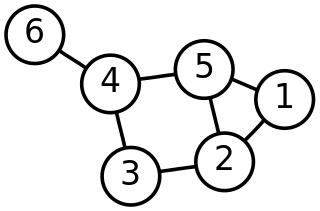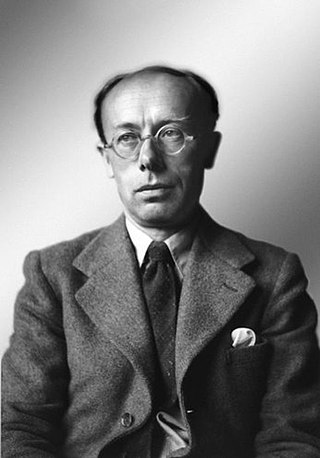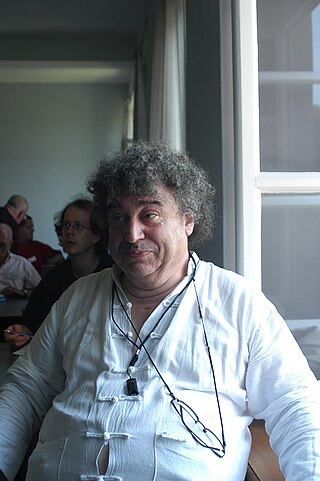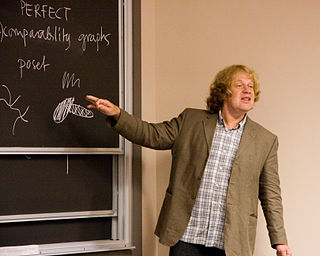Related Research Articles
Combinatorics is an area of mathematics primarily concerned with counting, both as a means and as an end to obtaining results, and certain properties of finite structures. It is closely related to many other areas of mathematics and has many applications ranging from logic to statistical physics and from evolutionary biology to computer science.

Discrete mathematics is the study of mathematical structures that can be considered "discrete" rather than "continuous". Objects studied in discrete mathematics include integers, graphs, and statements in logic. By contrast, discrete mathematics excludes topics in "continuous mathematics" such as real numbers, calculus or Euclidean geometry. Discrete objects can often be enumerated by integers; more formally, discrete mathematics has been characterized as the branch of mathematics dealing with countable sets. However, there is no exact definition of the term "discrete mathematics".

Maxwell Herman Alexander Newman, FRS, generally known as Max Newman, was a British mathematician and codebreaker. His work in World War II led to the construction of Colossus, the world's first operational, programmable electronic computer, and he established the Royal Society Computing Machine Laboratory at the University of Manchester, which produced the world's first working, stored-program electronic computer in 1948, the Manchester Baby.

The Z notation is a formal specification language used for describing and modelling computing systems. It is targeted at the clear specification of computer programs and computer-based systems in general.

Arthur John Robin Gorell Milner was a British computer scientist, and a Turing Award winner.

Robert Sedgewick is an American computer scientist. He is the founding chair and the William O. Baker Professor in Computer Science at Princeton University and was a member of the board of directors of Adobe Systems (1990–2016). He previously served on the faculty at Brown University and has held visiting research positions at Xerox PARC, Institute for Defense Analyses, and INRIA. His research expertise is in algorithm science, data structures, and analytic combinatorics. He is also active in developing college curriculums in computer science.

Patrick Maynard Stuart Blackett, Baron Blackett,, was a British experimental physicist known for his work on cloud chambers, cosmic rays, and paleomagnetism, awarded the Nobel Prize in Physics in 1948. In 1925 he became the first person to prove that radioactivity could cause the nuclear transmutation of one chemical element to another. He also made a major contribution in World War II advising on military strategy and developing operational research. His views saw an outlet in third world development and in influencing policy in the Labour government of the 1960s.

Sir Maurice Vincent Wilkes was an English computer scientist who designed and helped build the Electronic Delay Storage Automatic Calculator (EDSAC), one of the earliest stored program computers, and who invented microprogramming, a method for using stored-program logic to operate the control unit of a central processing unit's circuits. At the time of his death, Wilkes was an Emeritus Professor at the University of Cambridge.

The Department of Computer Science and Technology, formerly the Computer Laboratory, is the computer science department of the University of Cambridge. As of 2023 it employed 56 faculty members, 45 support staff, 105 research staff, and about 205 research students. The current Head of Department is Professor Alastair Beresford.

Philippe Flajolet was a French computer scientist.

Clifford "Cliff" B. Jones is a British computer scientist, specializing in research into formal methods. He undertook a late DPhil at the Oxford University Computing Laboratory under Tony Hoare, awarded in 1981. Jones' thesis proposed an extension to Hoare logic for handling concurrent programs, rely/guarantee.
Richard Simpson Bird was an English computer scientist.
In mathematics and abstract algebra, a Boolean domain is a set consisting of exactly two elements whose interpretations include false and true. In logic, mathematics and theoretical computer science, a Boolean domain is usually written as {0, 1}, or
Robert Arnott Wilson is a retired mathematician in London, England, who is best known for his work on classifying the maximal subgroups of finite simple groups and for the work in the Monster group. He is also an accomplished violin, viola and piano player, having played as the principal viola in the Sinfonia of Birmingham. Due to a damaged finger, he now principally plays the kora.

Professor Anthony John Grenville Hey was vice-president of Microsoft Research Connections, a division of Microsoft Research, until his departure in 2014.

János Pach is a mathematician and computer scientist working in the fields of combinatorics and discrete and computational geometry.
Jayme Luiz Szwarcfiter is a computer scientist in Brazil.
The Oeconomist, full title The Oeconomist, Or, Englishman's Magazine, was an English monthly periodical at the end of the 18th century. It was published in Newcastle upon Tyne, and was edited by Thomas Bigge, in partnership with James Losh.
Ewan Stafford Page is a British academic and computer scientist, and former vice-chancellor of the University of Reading.
Jean Berstel is a French mathematician and theoretical computer scientist known for his contributions to combinatorics on words and formal language theory. He is a currently a professor emeritus at the University of Marne-la-Vallée.
References
- 1 2 Who's who in science in Europe : a biographical guide in science, technology, agriculture, and medicine. Detroit, MI, USA: Longman. 1984. p. 786. ISBN 978-0-582-90109-4.
- 1 2 Szwarcfiter, Jayme Luiz; Wilson, Leslie Blackett. "The cycle cover problem", University of Newcastle upon Tyne, Computing Laboratory, Report Series, no. 131, 1979.
- ↑ King, Kim N. (1992). "The evolution of the programming languages course". ACM SIGCSE Bulletin . 24 (1): 213–219. doi: 10.1145/135250.134553 .
- ↑ Reynolds, Chris (22 April 1989). "Computers in context". New Scientist . 1661: 63–64.
- 1 2 Wilson, Leslie Blackett; Clark, Robert George (1993). Langages de Programmation Comparés. Paris: Addison-Wesley France. p. 452. ISBN 978-2-87908-060-4.
- ↑ "120 citations of: McVitie, David Glen and Wilson, Leslie Blackett, "The stable marriage problem", Communications of the ACM 14 (1971), 486--490". Google Scholar . Retrieved 9 February 2012.
- ↑ "102 citations of: McVitie, David Glen and Wilson, Leslie Blackett, "Stable marriage assignment for unequal sets", BiT Numerical Mathematics 10 (1970), 295--309". Google Scholar . Retrieved 9 February 2012.
- ↑ "Jayme Luiz Szwarcfiter". Currículo do Sistema de Currículos Lattes . Conselho Nacional de Desenvolvimento Científico e Tecnológico . Retrieved 11 February 2012.